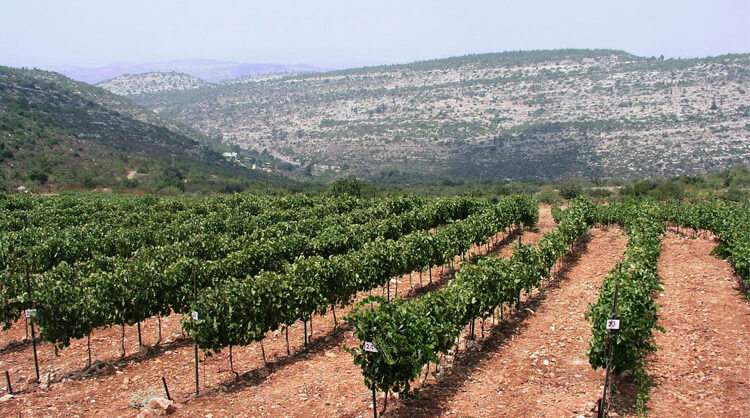 The Israeli wine industry and indeed the whole wine scene may soon look very different. More than 300 wineries are scattered to the length and width of the country, over 80% of them small boutique and garage wineries, mostly situated in agricultural settlements. If no major changes are made to a recently passed law, or to the approach of the Israeli land authorities, in a few years to come the number of Israeli wineries may drop sharply, as scores of small wineries shall be in effect forced out of business.
The Israeli wine industry and indeed the whole wine scene may soon look very different. More than 300 wineries are scattered to the length and width of the country, over 80% of them small boutique and garage wineries, mostly situated in agricultural settlements. If no major changes are made to a recently passed law, or to the approach of the Israeli land authorities, in a few years to come the number of Israeli wineries may drop sharply, as scores of small wineries shall be in effect forced out of business.
Actually much of this story is not really new. Surprisingly, hundreds of Israeli wineries have been operating for many years without proper licensing, not by lack of want, but due to impossible bureaucracy and strict land laws. The difference is that in the past there was hardly any supervision and penalties were sparsely inflicted, if at all. A law passed very recently, transferring the supervision duties from the Ministry of Industry and Commerce to the Ministry of Health, threatens (from the wineries point of view), to change the situation completely, since the Ministry of Health, different from the former ministry in charge, has an organized supervision system and additionally, possesses the legal authority to actually shut down operations of producers working without Production Licenses.
The strange part is that the problem does not lie with the immediate health requirements imposed by the new law. Though changes and indeed some investment will be required, most small wineries will be able to fulfill the new requirements. Tzachi Dotan, CEO of the Israeli Wine Grape Board (IWB), told me that according to a survey recently performed by the IWB, concerning 85% or more of the small wineries, there is reasonable feasibility for obtaining a Production License. The ultimate difficulty however, is embedded unexpectedly in Israeli land laws.
Due to historical reasons, about 90% of Israeli lands are state owned, especially agricultural lands, and these lands are leased out by the Israeli Land Authority (ILA) to their holders for prolonged periods of time (up to 99 years). Thus, land use is limited by the land deeds issued by the ILA, and if a land holder wishes to change the land usage purpose, he is required to pay a special permit fee to the ILA. Permit fees are calculated among others according to the value of the specific plot.
Wineries are considered by Israeli law to be production and not agricultural facilities. Visitor centers are considered as a commercial activity. Neither is allowed on agricultural lands, without obtaining special ILA permits. Permits cost money, and as will be further explained, in some cases may cost loads of it.
 Increasing land and property value and a great shortage of housing have been a big issue in Israel for more than 10 years now. Since 2006, prices in most areas skyrocketed by more than 400 percent! Needless to say, salaries haven’t changed much during that period. Headlines concerning the subject are to be found daily in the newspapers. This has also become an eminent political and public issue, since for most young families, purchasing an apartment has become an impossible feat. Though the government has already tried many modes of action in order to bring down housing prices, it seems that all efforts failed.
Increasing land and property value and a great shortage of housing have been a big issue in Israel for more than 10 years now. Since 2006, prices in most areas skyrocketed by more than 400 percent! Needless to say, salaries haven’t changed much during that period. Headlines concerning the subject are to be found daily in the newspapers. This has also become an eminent political and public issue, since for most young families, purchasing an apartment has become an impossible feat. Though the government has already tried many modes of action in order to bring down housing prices, it seems that all efforts failed.
Here we arrive at the core of the problem standing in front of the owners of Israel's small wineries. A prior requirement for obtaining a Production License is holding a building permit for the winery and visitors center buildings. If your winery is built on state owned property, like practically all of the rural wineries are, the ILA is required to sign your Building Permit Request, as an indication of approval. The ILA will not hand out its consent if the winery operates on land intended for agricultural purposes, unless permit fees are duly payed. No payment, means no Land Authority signature, i.e. no building permit. In the absence of a building permit, there is no way you can acquire a production license, which now may indeed lead to the closure of the winery.
Whereas in the periphery of the far north and south it may be feasible to acquire ILA Special Permits, since land value and therefore the permit fees deriving from it are yet reasonable, the picture in more desired areas where land values are much more expensive is a totally different one. In those regions, obtaining a permit for the operation of a winery and/or a visitor's center from the ILA becomes a totally non-financial option for wineries producing up to 50,000 bottles a year or even more, especially since many of the smaller ones are hardly profitable. Many of Israel's small boutique wineries, including quite a few of high quality ones, are located in these regions, which include among others the Coastal Plain, Mount Carmel, and the Judean Hills and Foothills.
Under pressure from the Israeli Wine Board, the Ministries of Agriculture and of Tourism and other factors, the Ministry of Health understood that quite a few problems are to be solved before the new regulations can be implemented in full, and for the meantime agreed to postpone the legality of the regulations, until the end of 2017 and also suggested some amendments to the new law. However, the real problem that lies with the new regulations – the issue of ILA requirements for operation of a winery on agricultural lands, is yet to be tackled, and at this moment in time, there is no actual solution to be seen in the gloomy horizon.
 It is not yet certain how, if at all, this problem may be resolved, and as a consequence, if the number of Israeli wineries is soon to greatly decline. By quantity, the small wineries hold a mere 5% share of the market. However, keeping in mind that the boutique wineries played a crucial part in the onset of the Israeli "Wine Quality Revolution" of the mid 1980's, and due to their vast contribution to Israeli Wine and Agro Tourism, the situation described above constitutes a great cause of worry not only for the winery owners, but as a matter of fact, for the whole industry, and of course for the consumers. This is why the IWB is currently making great efforts in order to recruit as much governmental and regional bodies as possible to the cause, hoping to find solutions that will enable the small boutique wineries to continue to thrive.
It is not yet certain how, if at all, this problem may be resolved, and as a consequence, if the number of Israeli wineries is soon to greatly decline. By quantity, the small wineries hold a mere 5% share of the market. However, keeping in mind that the boutique wineries played a crucial part in the onset of the Israeli "Wine Quality Revolution" of the mid 1980's, and due to their vast contribution to Israeli Wine and Agro Tourism, the situation described above constitutes a great cause of worry not only for the winery owners, but as a matter of fact, for the whole industry, and of course for the consumers. This is why the IWB is currently making great efforts in order to recruit as much governmental and regional bodies as possible to the cause, hoping to find solutions that will enable the small boutique wineries to continue to thrive.
Solutions must surely be found and quickly so, since without the boutique wineries, the entire Israeli wine scene and undoubtedly also the quality of Israeli wines which has risen on account of these wineries will be immensely changed, and certainly not for the better.



